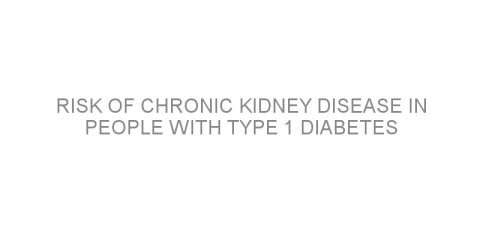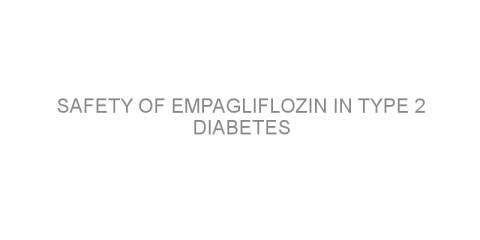In a nutshell This study investigated factors that may lead to the development of chronic kidney disease (CKD) in patients with type 1 diabetes (T1D). Some background CKD is a serious complication of T1D. CKD is detected in two ways. One is a reduction in eGFR (estimated glomerular filtration rate; a measure of kidney function). The other is the...
Read MoreDiabetes mellitus Posts on Medivizor
Liraglutide versus sitagliptin in people with type 2 diabetes
In a nutshell This study compared the effectiveness and safety of liraglutide (Victoza) and sitagliptin (Januvia) in people with type 2 diabetes (T2D) who were being treated with metformin (Glucophage). It was determined that liraglutide controls blood glucose levels better, and results in more weight loss than sitagliptin. However, liraglutide...
Read MoreCan early control of blood sugar levels reduce the risk of heart disease?
In a nutshell This study investigated whether early control of blood sugar levels reduced the risk of developing heart disease. The authors concluded that those who managed to control their blood-sugar early were less likely to develop heart disease. Some background Patients with type 2 diabetes are advised to control blood sugar levels as...
Read MoreDoes the use of GLP-1RAs protect against later heart-disease?
In a nutshell This study examined whether the use of glucagon-like peptide-1 receptor agonists (GLP-1RAs) protected against later heart disease in type 2 diabetes. The authors concluded that GLP-1RAs significantly reduced the risk. Some background Glucagon-like peptide-1 receptor agonists (GLP-1RAs) are commonly used to treat type 2 diabetes...
Read MoreSafety of empagliflozin in type 2 diabetes
In a nutshell This study investigated the safety of empagliflozin (Jardiance) in patients with type 2 diabetes (T2D). It was determined that empagliflozin is a safe drug, but may increase the risk of genital infections. Some background Empagliflozin is an SGLT2 inhibitor. SGLT2 is a protein in the kidneys that is important in controlling blood...
Read MoreFlaxseed oil omega-3 fatty acids: a new treatment for diabetic foot ulcer?
In a nutshell This study investigated the effects of supplementation with flaxseed oil omega-3 fatty acids on diabetic foot ulcers. They found that treatment with omega-3 fatty acids improved diabetic would healing over a 12-week period. Some background Diabetic foot ulcer (DFU) is a serious complication of diabetes, causing a debilitating...
Read MoreCan intensive control of blood sugar help prevent kidney, eye, and nerve complications?
In a nutshell This study assessed the potential benefits of controlling blood sugar to a strict level. The authors concluded that intensive blood-sugar control prevented kidney and eye complications, but not nerve complications. Some background Poorly-managed...
Read MoreSGLT2 inhibitors and infections
In a nutshell This study investigated the effects of SGLT2 inhibitors on urinary tract infections (UTIs) and genital infections in patients with type 2 diabetes (T2D). It was determined that SGLT2 inhibitors increase the risk of genital infections, but not UTIs. Some background SGLT2 is a protein in the kidneys that is important in controlling...
Read MoreGlyburide: a safe and effective medication for the treatment of gestational diabetes?
In a nutshell This study investigated if glyburide (Glynase) was safer and more effective than insulin in patients with gestational diabetes. They found that glyburide was associated with an increased risk of neonatal hypoglycemia (low blood sugar) but was well tolerated overall. Some background Gestational diabetes mellitus (GDM)...
Read MoreWhat anti-diabetic drugs are safe and effective in treating gestational diabetes?
In a nutshell This study investigated the safety and effectiveness of different drugs used to treat gestational diabetes. They found that metformin (Glucophage) is associated with fewer pregnancy complications than glyburide (Glynase), however it is less effective at managing blood sugar levels. Some background Gestational diabetes...
Read MoreCan lifestyle interventions improve glycemic control in people with advanced type 2 diabetes?
In a nutshell This study examined whether lifestyle interventions could improve control of blood glucose levels (glycemic control) in people with advanced type 2 diabetes (T2D). They determined that certain lifestyle interventions resulted in a significant decrease in HbA1c levels (a measure of glycemic control). Some background T2D is...
Read MoreCan lifestyle intervention improve blood sugar control in patients with type 2 diabetes?
In a nutshell This study investigated whether lifestyle interventions improved glycemic (blood sugar) control in patients with type 2 diabetes. They found that lifestyle intervention slightly improved glycemic control and reduced the needed dose of diabetes medication in these patients. Some background Managing type 2 diabetes initially...
Read More














